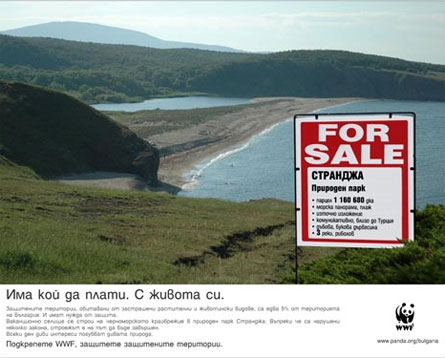
For Sale: Strandzha Nature Park. Parcel 1 160 680 dka; view of the sea, beach; located in the east in proximity to Turkey; oak and beech forests; 3 rivers, fishing. Nature pays with its life. Support WWF, protect protected areas. (Source: panda.org/bulgaria)
The June 29, 2007 decision of the Bulgarian Administrative Court (VAS) to remove the protected status of the National Park Strandzha, has evoked a strong reaction from the Bulgarian blogsphere and also from the country's vibrant environmental movement. The two groups have united to defend the country's largest protected area, which is located on the South Black Sea coast, with its unique eco-systems, biodiversity, cultural and historical heritage.
The Supreme Court’s ruling stems from an appeal by the mayor of the Tsarevo municipality and the investor (Crash 2000) in the Zlatna Perla Golden Pearl holiday village, near the town of Varvara. Construction on the vacation complex was suspended because of Strandzha National Park's status as a protected area. The court's decision to strip Strandzha of its protected status has been perceived as an “illustration of the state’s inability to protect public interest, nature, and to enforce its own legislation under pressures of private business powers.”
The response of the Bulgarian environmental stakeholders to this threat against the natural ecosystem of Strandzha Mountain was quick and well-coordinated. Utilizing every method from blog posts to street blockades to SMS to flash mobs, the web-led movement has succeeded in stimulating significant offline activity. “All information was disseminated mainly through mailing lists, SMS-s and on-line,” said BlueLink Information Network executive director Milena Bokova, whom I spoke with about the issue. With its smart use of the Internet and new media appplications such as online petitions (more than 13.900 signatures addressed to Bulgarian Administrative Court were collected – see the petition in English), blogs, and video- and photo-sharing sites, the Bulgarian environmental movement mobilized a substantial demonstration for the protection of the Strandzha Park, and won sympathy for its case.
And it is largely thanks to the Bulgarian Blogsphere and to the e-movement that the attention of the national mainstream media was captured. “The dissemination of information about the Strandja and other environmental cases in Bulgaria via video and photo sharing sites helped a lot in attracting the attention of the Bulgarian mainstream media,” said Milena Bokova. (See the interview with blogger Michel Bozgounov broadcasted on the Bulgarian National TV -Youtube: part1 | part2).
As a result of the attention, Bulgarian police issued a call to bloggers, pressuring them “to stop writing about the recent wave of environmental protests that has swept across the country in the recent weeks.” One blogger summoned by the General Directorate for Combat against Organized Crime was Michel Bozgounov, BlueLink's web designer, who reported the incident on his blog:
Last week I received summons to visit the Sofia Metropolitan Police Department and absolutely not aware what is this about […] There they asked me about my website (my blog) and about the Strandja protests. I had to write some explications and also signed a warning protocol, saying that I should not write in my blog anything that could call to disorderly conduct (like unofficial protests) and so on. I saw a line in the police documents, saying “the website www.optimiced.com must be investigated (watched constantly)”. I read on the top of the documents in front of me the name of the National Service for Combat against the Organized Crime, which indeed puzzled me. […] Also there were printed sheets of paper from another blog of a guy, who wrote as well about the Strandja case, and he is also a journalist. On the stairs one of the police officers told me “in private” that I should be more careful what I am writing about in future, because journalists have a better defense against possible prosecution and I am just an ordinary person, an independent blogger.
The Bluelink network reacted to the intimidation of Michel Bozgounov and other bloggers by launching the Freenet Campaign. “We unconditionally support the actions of each engaged citizen, who have the right to express his or her position on actions (or lack thereof) of Bulgarian institutions through writing or other communication forms; We support and will defend the unconditional right of every Bulgarian citizen to peaceful and non-violent protests and for information dissemination of such protests,” Bluelink said in a statement announcing the launch of Freenet.
The outpouring of support from the Bulgarian blogsphere for fellow blogger Michel Bozgounov was also overwhelming. A group of bloggers sent a letter of protest to the European Commissioner of Human Rights, urging him “to take all necessary measures […] for preventing the Bulgarian Ministry of Interior Affairs and The Bulgarian Government in stepping up to this extremely dangerous path on combating free speech.”
“One of the deep reasons for defending internet freedom is its increasing importance for environmentalism (given legal recognition in the Aarhus convention, which grants the public rights regarding access to information and public participation and access to justice in environmental matters),” says Dr. Dan McQuillan, the current web manager at Amnesty International, who warned against ignoring the threats posed to the Online Free Speech. McQuillan adds that “It’s very worrying that most ecampaigners are ignoring these threats to the environment that they depend on. Of course, they’re all busy doing online campaigns for the core mission of their organizations, whether it’s environmental, human rights or whatever. But key techniques like blogging, social networking and global campaigning are already being impacted by reductions in internet freedoms.”
In Part Two of this article, I speak to Milena Bokova, who talks about the intimidation against her colleague, blogger Michel Bozgounov, the threats to the freedom of online expression in her country, and the Bluelink Freenet Campaign.

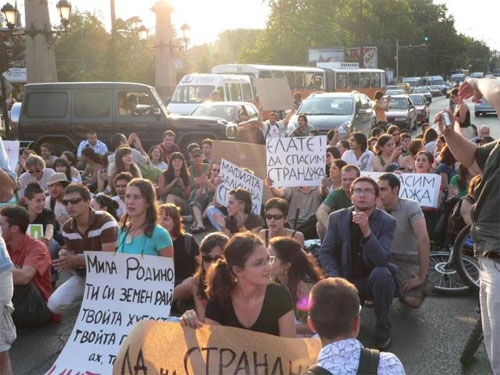
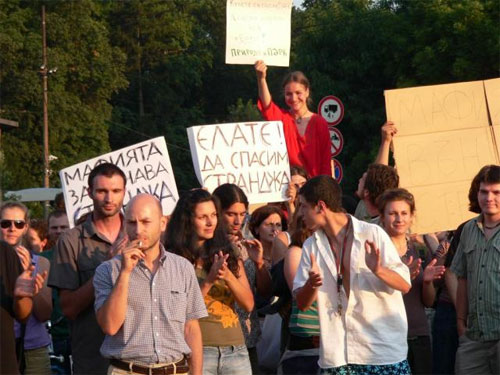
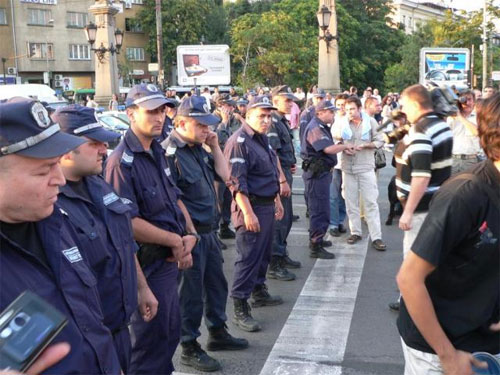

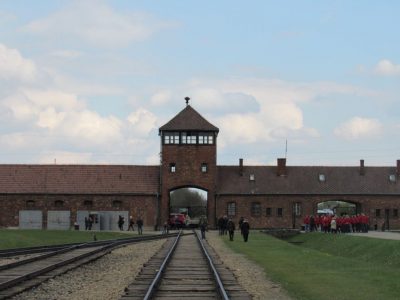

5 comments
I beleive what bulgarian people do to protect our enviromentaland. the interent es a very important tool, that any goverment has the right to censor it.Im from mexico city.
hoodia…
nice site dude….
I think this story covers the topic better:
http://www.globalvoicesonline.org/2008/03/31/bulgaria-against-the-internet-%e2%80%9cbugging%e2%80%9d